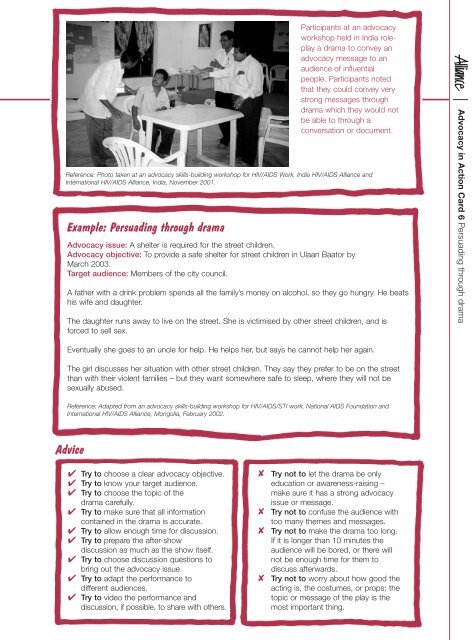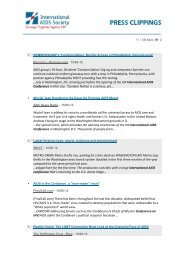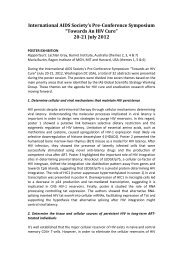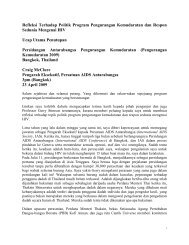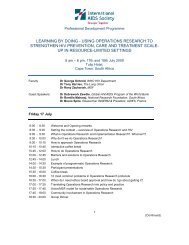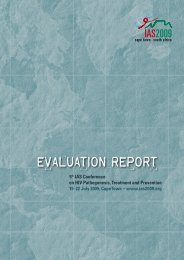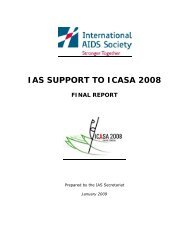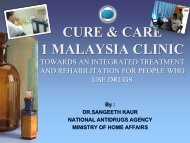Advocacy in Action - International AIDS Society
Advocacy in Action - International AIDS Society
Advocacy in Action - International AIDS Society
You also want an ePaper? Increase the reach of your titles
YUMPU automatically turns print PDFs into web optimized ePapers that Google loves.
Example: Persuad<strong>in</strong>g through drama<br />
Participants at an advocacy<br />
workshop held <strong>in</strong> India roleplay<br />
a drama to convey an<br />
advocacy message to an<br />
audience of <strong>in</strong>fluential<br />
people. Participants noted<br />
that they could convey very<br />
strong messages through<br />
drama which they would not<br />
be able to through a<br />
conversation or document.<br />
Reference: Photo taken at an advocacy skills-build<strong>in</strong>g workshop for HIV/<strong>AIDS</strong> Work, India HIV/<strong>AIDS</strong> Alliance and<br />
<strong>International</strong> HIV/<strong>AIDS</strong> Alliance, India, November 2001.<br />
<strong>Advocacy</strong> issue: A shelter is required for the street children.<br />
<strong>Advocacy</strong> objective: To provide a safe shelter for street children <strong>in</strong> Ulaan Baator by<br />
March 2003.<br />
Target audience: Members of the city council.<br />
A father with a dr<strong>in</strong>k problem spends all the family’s money on alcohol, so they go hungry. He beats<br />
his wife and daughter.<br />
The daughter runs away to live on the street. She is victimised by other street children, and is<br />
forced to sell sex.<br />
<strong>Advocacy</strong> <strong>in</strong> <strong>Action</strong> Card 6 Persuad<strong>in</strong>g through drama<br />
Eventually she goes to an uncle for help. He helps her, but says he cannot help her aga<strong>in</strong>.<br />
The girl discusses her situation with other street children. They say they prefer to be on the street<br />
than with their violent families – but they want somewhere safe to sleep, where they will not be<br />
sexually abused.<br />
Reference: Adapted from an advocacy skills-build<strong>in</strong>g workshop for HIV/<strong>AIDS</strong>/STI work, National <strong>AIDS</strong> Foundation and<br />
<strong>International</strong> HIV/<strong>AIDS</strong> Alliance, Mongolia, February 2002.<br />
Advice<br />
✔ Try to choose a clear advocacy objective.<br />
✔ Try to know your target audience.<br />
✔ Try to choose the topic of the<br />
drama carefully.<br />
✔ Try to make sure that all <strong>in</strong>formation<br />
conta<strong>in</strong>ed <strong>in</strong> the drama is accurate.<br />
✔ Try to allow enough time for discussion.<br />
✔ Try to prepare the after-show<br />
discussion as much as the show itself.<br />
✔ Try to choose discussion questions to<br />
br<strong>in</strong>g out the advocacy issue.<br />
✔ Try to adapt the performance to<br />
different audiences.<br />
✔ Try to video the performance and<br />
discussion, if possible, to share with others.<br />
✘ Try not to let the drama be only<br />
education or awareness-rais<strong>in</strong>g –<br />
make sure it has a strong advocacy<br />
issue or message.<br />
✘ Try not to confuse the audience with<br />
too many themes and messages.<br />
✘ Try not to make the drama too long.<br />
If it is longer than 10 m<strong>in</strong>utes the<br />
audience will be bored, or there will<br />
not be enough time for them to<br />
discuss afterwards.<br />
✘ Try not to worry about how good the<br />
act<strong>in</strong>g is, the costumes, or props; the<br />
topic or message of the play is the<br />
most important th<strong>in</strong>g.


